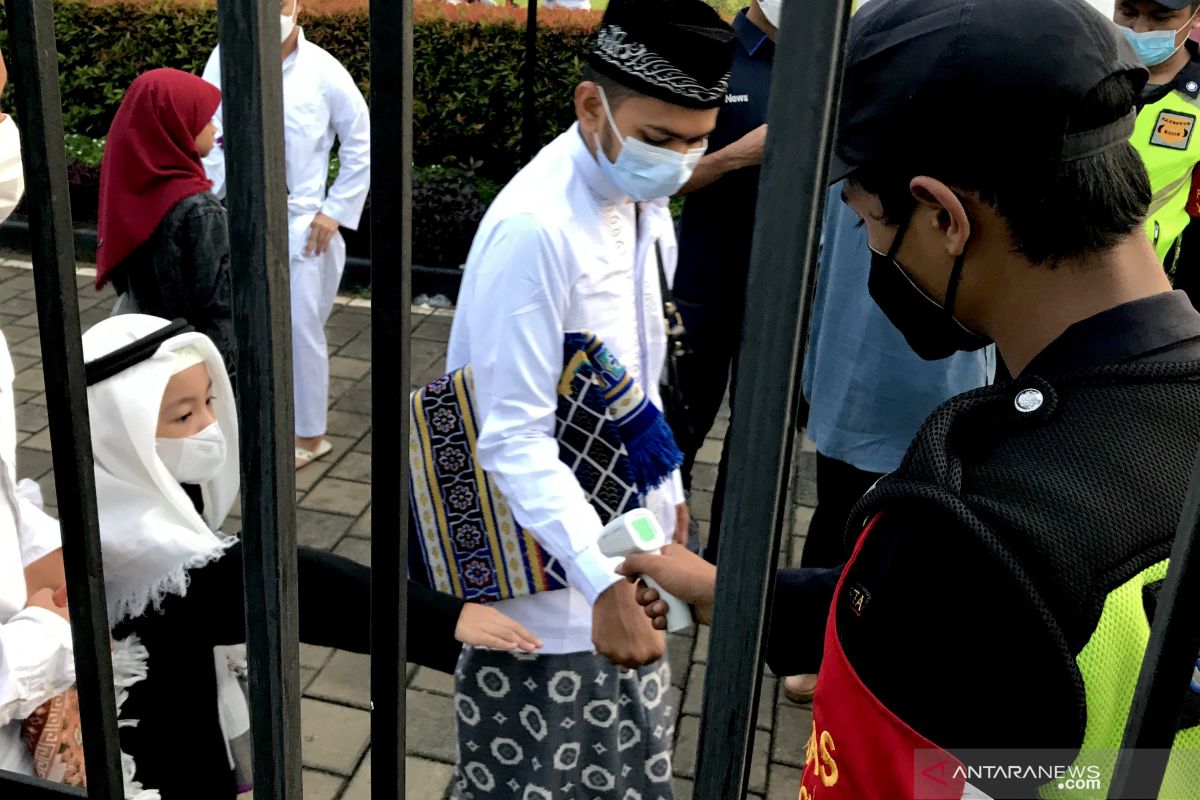The prayer was held in adherence to stringent COVID-19 protocols wherein the mosque's workers checked the body temperature of every mosque goer at the entrance gates.
Members of the congregation were also necessitated to wear mask and place their prayer mats at marked slots of their shaf (rows).
Members of the prayer organizing committee working on the sound system repeatedly reminded the congregation to maintain physical distancing measures by staying put in the designated shaf.
Local police officers were seen helping the organizing committee members manage the mosque goers to reduce the COVID-19 infection risks.
As part of its COVID-19 prevention measures, the Al Azhar Mosque management has decided to reduce the mosque's capacity by up to 50 percent for the Eid al-Fitr prayer.
Located near the ASEAN Secretariat complex area, the Al Azhar Mosque's normal capacity is recorded at 15,000 people.
Meanwhile, Jakarta Governor Anies Baswedan has fulfilled his promise to perform the Eid al-Fitr prayer at home.
Along with some 30 people, Baswedan performed the prayer in the backyard of his house in the Lebak Bulus neighborhood, South Jakarta, on Thursday morning.
Some 30 people, including Baswedan’s wife and children, partook in the prayer that commenced at 7 a.m. Western Indonesia Time (WIB) and was led by Ustadz Afifudien Rohaly.
Following the prayer conducted under strict COVID-19 protocols, Rohaly delivered the Eid al-Fitr sermon.
Amid the coronavirus disease pandemic, Baswedan had earlier appealed to Muslims living in the capital city to perform the Eid al-Fitr prayer at home.
The governor urged Jakartans keen to perform the prayer at mosques to go to the house of worship in the areas of their community units.
The capacity of mosques and soccer fields used for performing the Eid al-Fitr prayer must be reduced by up to 50 percent, he stated.
The Eid al-Fitr festivity, marking the end of the holy month of Ramadhan, is celebrated by Muslims across the globe.
Traditionally, the Eid al-Fitr festivity is often regarded by Indonesian Muslims as a time to seek blessings and forgiveness from parents and to strengthen "silaturrahim," or the bonds of friendship.
However, in the wake of the COVID-19 pandemic situation, Vice President Ma'ruf Amin had earlier called on Indonesian Muslims to uphold "silaturrahim" virtually.
The novel coronavirus disease outbreak initially struck the Chinese city of Wuhan in 2019 and then spread to various parts of the world, including countries in the Asia-Pacific region.
The Indonesian government announced the country's first confirmed cases on March 2, 2020.
Since then, the central and regional governments have made persistent efforts to flatten the coronavirus curve by imposing healthcare protocols and social restrictions.
To break the chain of transmission of COVID-19, which has impacted the purchasing power of scores of families in Indonesia, the government has banned homebound travel, or "mudik," ahead of this year's Eid al-Fitr holiday season akin to last year.
The Health Ministry has also confirmed the entry of three new coronavirus variants into Indonesia, including those originating from India, South Africa, and the Great Britain.
Related news: Minister urges Muslims to perform Eid al-Fitr prayer at home
Related news: Skip Eid prayer if coronavirus continues unabated: MUI to congregants EDITED BY INE
Penerjemah: Rahmad Nasution
Editor: Suharto
Copyright © ANTARA 2021


